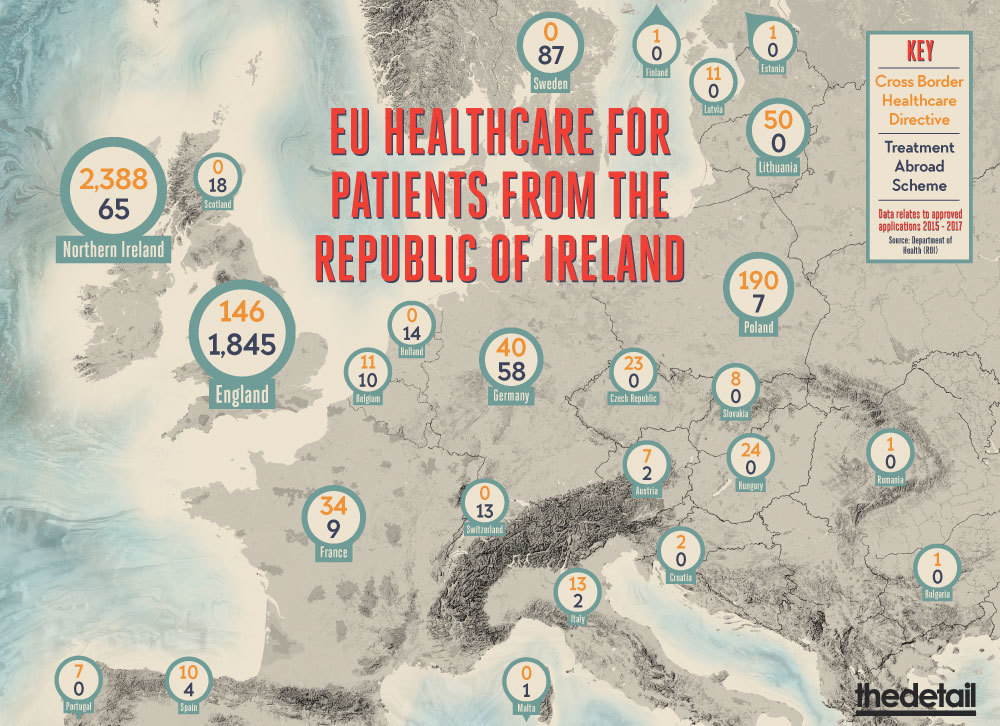MORE than 4,000 applications were approved over three years for patients in the Republic of Ireland seeking treatment in the UK under two EU healthcare schemes – the future of which have yet to be agreed in the wake of the Brexit vote.
Although patients from the Republic will continue to be able to access treatment in other EU member states, nearly nine out of every 10 applications they made in the years 2015 to 2017 were for treatment in Northern Ireland, England and Scotland.
An analysis by The Detail of three years of applications from people living across the island of Ireland for two cross border healthcare initiatives found that there were 5,710 applications for treatment elsewhere in Europe – 607 (11%) of those were from patients in Northern Ireland.
The other 5,103 applications related to patients from the Republic of Ireland with 4,462 (87%) of those treatments sought in the UK.
However, these figures could be much higher in reality after the head of a private hospital in Belfast revealed it has carried out more than 2,500 consultations and 2,000 procedures on patients from the Republic under the Cross Border Healthcare Directive this year alone.
Chief executive of Kingsbridge Private Hospital Mark Regan, who said consultations peaked last month, added: “The numbers don’t really get across the personal impact that Brexit 'could have' to so many individuals who wouldn’t be able to come to Northern Ireland if the right deal isn’t struck.
“Many of the Royal Colleges now recommend patients not to fly for six weeks or more after joint replacement surgery as it increases the risks of getting a clot (deep vein thrombosis). If, post-Brexit, Irish patients can’t come to Belfast, then this will place them in a compromising position of needing to fly home from mainland Europe with these risks in mind.
“These patients come in fairly equal numbers from all over Ireland, including Cork, Tralee, Galway, Donegal, Dublin. Distance is not a barrier.”
Over the three years examined by The Detail, patients from the Republic accessed €37.9m worth of treatments under both directives while Northern Ireland residents received £1.7m worth of healthcare as part of the Cross Border Healthcare Directive. Northern Ireland’s Health and Social Care Board (HSCB) does not hold cost information on the second directive known there as S2.
Treatments under both schemes included procedures relating to orthopaedics, gynaecology and oncology and patients also travelled to countries such as Poland, Lithuania and Germany for healthcare.
As the map above compiled by The Detail shows, there were 2,453 applications (48%) from the Republic of Ireland for healthcare in Northern Ireland and 1,991 applications (39%) for treatment in England.
A breakdown of the Northern Ireland figures by country was not provided by the Health and Social Care Board.
Over eight times as many patients from the Republic utilised the schemes compared to Northern Ireland. There are significant differences between how the health services operate on both sides of the border.
In Northern Ireland there is universal free healthcare. Public healthcare is available to patients in the Republic but comes with some costs and around half of the population has private health insurance.
Stormont’s Department of Health has confirmed only one of the initiatives – the one with the lower uptake and known as S2 in Northern Ireland and Treatment Abroad Scheme in the Republic – has been included in the UK’s negotiations with the European Union on the terms of its withdrawal but has yet to be finalised.
However, the Republic’s Department of Health said “technical discussions” on how to maintain both schemes – the other is known as the Cross Border Healthcare Directive – post-Brexit are currently ongoing.
Both initiatives allow patients to access healthcare in another European country if it is not available in their home country or to avoid long waiting lists.
The Treatment Abroad/S2 scheme is consultant-led and only allows access to treatment in a public setting, while the patient can choose where to have treatment under the Cross Border Healthcare Directive and this can be offered in either a public or private facility. Unlike the other scheme, the Cross Border Healthcare Directive can be used even if the treatment is offered locally and within an appropriate timeframe.
Experts have raised concerns about the impact of the UK’s withdrawal from the EU on both Irish and British citizens seeking vital healthcare treatment outside the jurisdiction.
According to human rights organisation the Committee on the Administration of Justice (CAJ), legislation will have to be amended to protect access to these schemes.
CAJ deputy director Daniel Holder said: “Throughout the Brexit process, the British government has talked up what have been referred to as the ‘associated rights’ of the UK-Ireland Common Travel Area (CTA) as a mechanism for providing reciprocal access to services in a post-Brexit context.
“However, they have been painfully short of detail as to what these are and there is no visible tangible progress in putting together a framework for access to these rights.
“It took a parliamentary question in June to even get clarity as to what the reciprocal areas are. This confirmed that ‘reciprocal health services’ is one of the areas – but we don’t know if that includes border provision.
“What’s more, the government is seeking to restrict CTA rights to British and Irish citizens. Therefore, anyone else living in Northern Ireland needing medical care that is unavailable north of the border – ironically including many non-British and non-Irish NHS workers – may be excluded.
“Initially, the UK actually argued that the legal framework to ensure mutual reciprocal access for British and Irish citizens for associated CTA rights was already provided for. They have now realised this is not the case and legislation needs changed – yet no legislation has yet been brought forward even at this late stage.
“There have been worrying soundings from both governments suggesting that they want the CTA to remain a ‘loose arrangement’, rather than something tied down with a treaty or other mechanism, meaning rights related to the CTA could be taken away at any time.”
THE SCHEMES
The two schemes are in addition to the European Health Insurance Card (EHIC) which allows access to free or reduced cost state-provided healthcare during a temporary stay in certain European countries and of which over 641,953 valid cards exist in Northern Ireland.
Around 62% of the applications for healthcare services in another European country during the period examined – outside of the EHIC scheme - were made under the Cross Border Healthcare Directive (CBD).
A total of 3,522 CBD applications were approved across the island of Ireland over three years – of these 2,968 were from the Republic and 554 from Northern Ireland.
There were 2,135 applications for the Republic’s Treatment Abroad Scheme, which is known as S2 in Northern Ireland and had just 53 applications there.
The Republic’s Department of Health records its successful applications by calendar year while Northern Ireland’s Health and Social Care Board’s figures relate to financial year. The figures we have published today relate to a three-year period in both jurisdictions between January 2015 and December 2017 for the Republic and from April 2015 to March 2018 for Northern Ireland.
They refer to the number of applications approved and one patient could account for several applications or treatments. Furthermore, patients approved for treatment in their country may be deemed unsuitable by the healthcare provider abroad and so may not ultimately receive the care.
Treatment costs will be paid either at a national level between governments or by the person’s local health board reimbursing the patient.
A spokesperson for Stormont’s Department of Health said: “The Department of Health has identified the Cross Border Healthcare and access to healthcare in other EU states post-exit as EU Exit priorities for health and social care.
“The department is working closely with counterparts in other Northern Ireland departments, England, Scotland, Wales and the Republic of Ireland as we prepare for the implications of leaving the EU and determine the decisions and actions that need to be taken.”
The Republic’s Department of Health said: “The Irish and UK Governments are committed to maintaining the reciprocal rights of access to healthcare for both Irish and UK citizens to publicly-funded health services.
“Technical discussions, involving the Departments of Health from Ireland, Northern Ireland and the UK on how to maintain these arrangements post-Brexit, are currently ongoing and includes work on the Cross Border Directive and Treatment Abroad Scheme.”
THE TREATMENT

Kingsbridge Hospital in south Belfast treats patients from the Republic of Ireland under the Cross Border Healthcare Directive. Picture by Brian Morrison.
Mark Regan, chief executive of Kingsbridge Private Hospital which treats patients from the Republic at its Belfast facility on the Lisburn Road, said it is more beneficial for people to travel from the south to Northern Ireland than it is for people to travel in the opposite direction due to the higher cost of healthcare in the Republic.
For example, he said, the cost of a hip replacement operation south of the border is nearly double that of an NHS hospital in Northern Ireland, whereas a private facility in the north will carry out the procedure for around the same price as a state-funded hospital in the Republic.
He said: “In the Republic, waiting lists are two or three years’ long so people are coming for things that impact their lives substantially. They are coming up for life-changing procedures. They might be unable to work and are housebound.
“Sixty per cent of what we deal with is orthopaedics – so hips and knees – and another 10 to 15 per cent are for cataracts where people can’t physically see. Then the remaining 20 to 25 per cent is hysterectomies and other lumps and bumps that would impact your life but might not stop you from leaving the house.”
One such patient was Noeleen Finnegan from near Castleblayney in Co Monaghan who was treated at the Kingsbridge Hospital in Belfast within weeks of an initial consultation.
The 58-year-old had recently undergone major heart surgery when she found herself suffering from crippling pains in her legs.
Tests revealed she needed both her hips replaced but without health insurance she was facing a further 15 months on a public hospital waiting list in the Republic of Ireland, nine months after first being referred in March 2017.
She told The Detail: “[The Cross Border Healthcare Directive] is such a great system. I know a couple of people who have used it. When I think of Brexit, I don’t know what will happen. I’m thinking of other people in the same situation as me, in so much pain. I think it will be awful.”
Click here to read Noeleen’s story in full.
Unlike the Cross Border Healthcare Directive, the S2 route/Treatment Abroad Scheme covers travel expenses, which has led to concerns about increased costs if patients have to travel further for treatment post-Brexit.
Irish Patients’ Association spokesman Stephen McMahon said: “It may mean that patients [from the Republic] can still get access to the treatment but it won’t be in the UK, it could be somewhere like France or Germany which would be an inconvenience. Travel costs may go up but there would still be a duty on the [Irish] state to pay for that.
“There’s such a close relationship between the two health systems, we would want this relationship to continue without any sort of barriers that could put patients’ lives at risk or if there’s a danger of them having a poorer quality of life.”
 By
By


